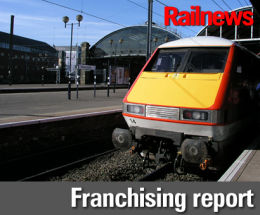Posted 24th November 2015 | 2 Comments
Franchising poses 'emerging risks' three years after West Coast collapse

RAIL franchising poses 'emerging risks', with uncertainty, delays and cost increases affecting major infrastructure works, the risk of reduced competition and 'potentially stretched' resources, according to a report published by the National Audit Office today.
However, it also concludes that the Department for Transport has improved the management of its rail franchising programme since the collapse of the Intercity West Coast competition just over three years ago.
The flawed award of the West Coast contract to FirstGroup had to be withdrawn after it became clear that there had been serious errors in the DfT's calculations, and the franchise will remain with Virgin and Stagecoach until at least 2017.
The NAO said that the Department has now 'largely addressed' the recommendations made by the NAO, the Committee of Public Accounts, and Sam Laidlaw, who was appointed to investigate how the errors had occurred, while Richard Brown was given the task of replanning the franchising programme.
The NAO found that the DfT 'has taken steps to improve its capability and has strengthened its leadership. It is also taking steps to strengthen its franchise management capacity and capability'.
It also concluded that the Department's decision to let 'direct awards' to incumbent operators was a 'sensible temporary measure' which 'may have missed opportunities to maximise value for money in the early direct awards because the benchmark used was too low and not designed for the purpose'.
Looking further ahead, the scale and complexity of planned infrastructure work and the major decisions which will have to be made about the construction schedule for High Speed 2 present further challenges for franchising, the NAO added.
Amyas Morse, head of the National Audit Office, said: “Since the collapse of the West Coast Main Line franchise competition, the Department has improved its management of rail franchising. Results of early franchise competitions indicate that returns to taxpayers could be higher than in the past.
“However, important risks remain. There is considerable uncertainty and volatility around the rail infrastructure improvement programme. And there are risks to effective competition should market interest decline. The Department recognises these challenges and is taking steps to address them.”
A spokesman for the Rail Delivery Group said: "The Rail Delivery Group is working with the government to improve further how passenger services are delivered, building on the solid achievements of the last three years. Providing services that meet the changing needs of passengers, taxpayers and wider stakeholders is key to building partnership between the railway and government.”
Reader Comments:
Views expressed in submitted comments are that of the author, and not necessarily shared by Railnews.

Chris Jones-Bridger, Buckley Flintshire
If there is a lesson to be learnt from the fallout from the WCML franchise debacle it is that short term savings demanded of DfT by ministers in the early days of the 2010-15 Coalition Govt have exposed the industry to long term costs while the franchising timetable has been reset. In reality badly needed investment in capacity for a growing network is being deprived of cash diverted to botched administration. The unfolding shambles in NR's CP5 settlement has been symbolic of the faltering strategic guidance from DfT.
The NAO adds to a growing list of reports into railway finances yet all fail to answer a fundamental concern, that is why there has been so much cost escalation in real terms in the industry since privatisation. Fragmentation has certainly introduced transaction costs between all parties but this doesn't explain the alarming escalation in project costs nor the way engineers and managers have accepted these costs as normal.
One would have hoped that benchmarking exercises undertaken by ORR would have exposed the root cause of this phenomena however given that the existence of ORR itself is part of the malaise of bloated administration I'm not surprised by the lack of answers.
Only DfT have a full picture of the railway's financial health. Is it too much to ask for an annual statement of profit or loss to be produced to enable the true value of subsidy, premium and investment to be evaluated?
david c smith, Bletchley
The Competition and Monopolies Authority are currently running an investigation into passenger rail competition, to which Virgin and Stagecoach are suggesting de-franchising main line intercity operations , with open access competition involving TOC's bidding for "bundles of paths".
i think this would be welcome, doing away with the current line-based monopoly franchises with their attendant heavily specified fixed-term contracts to give accountability. Hopefully accountability through effective competition can free operators to innovate, develop and invest long-term and be enterprising.
As loca[ / commuter operations can't support effective competition , they will need a different approach.